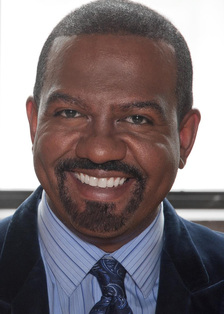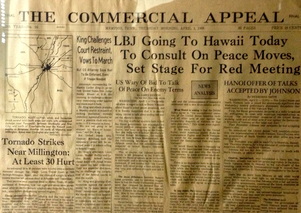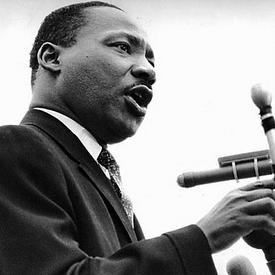 Actor Jolie Garrett
Actor Jolie Garrett My process is pretty straight forward. I start by memorizing the words the character has been given to say (his lines). I always read them out loud so that I can hear the specific sounds and I observe closely how just the sounds themselves affect me emotionally. After I have memorized the words, I start linking the words together into logical thought processes. One thought may be fourteen lines or a separate thought may be one word. Then I take those thoughts and connect them to specific actions. Acting is doing; the character is always doing something with his words.....persuading, scolding, wooing, condemning, inciting, tickling, probing, and so prevalently in The Mountaintop, calling to action! The final stage of my character building process is working with a director in rehearsal to find the TRUTH of the character. That is to say, finding out exactly why the character is in the play--what does he want and how is he going to go about getting it. In actor jargon we say, what is the character fighting for? Once you answer that question, then you work together to find the strongest and clearest actions to accomplish this task. I'm a stickler for finding clarity in any play. In order for an audience to understand what the playwright is saying, the actor must clearly understand what he is saying. Then your character continues to grow through performance of the play. Just as the actor continues to learn something new every day, so does his character. It is a never-ending process.
How have you been preparing to take on this role?
This role is unique in that I am representing a real-life icon, one revered by so many people around the world, Rev. Dr. Martin Luther King, Jr. Not only do people expect you to resemble him but also to sound like him. Playwright Katori Hall very cleverly writes in her stage directions how certain lines are to be said in "King voice." So, I had to find that register in my voice which matches Dr. King's to the best of my ability. I listened to his speeches on YouTube over and over again to get his cadences down--his modulations and inflections. Also, he spoke very slowly and measured when he gave those famous speeches of his (though none of them are in this play). He wanted to make sure the gravity of his words really hit home.
Is there anything about the role that intimidates you?
No. I consider it an honor to play Dr. King, one of the greatest humanitarians of our time. I feel more of a sense of pride and respect than intimidation.
What are the challenges behind portraying someone so well-known and iconic?
Sounding like him--he had one of the most recognizable voices in the world. Then when you get the voice down, the greater challenge is infusing the words with the kind of gravity and profound meaning that Dr. King brought to them. Though none of his famous speeches are in this play, Katori Hall has given me some very rich language to work with, language that I believe Dr. King himself might have used.
In The Mountaintop we get to see a side of Dr. King that many people are not familiar with--the private King. In this play he drinks, smokes, curses, flirts, laughs, and even challenges God. We are so used to seeing the world-weary Dr. King who is so serious and the fiery pulpit "Preacher 'Kang'." So, to show this other private side of him while still maintaining those facets of the iconic Dr. King that most people know is a great challenge.
The Mountaintop was one of the Top 10 Most Produced plays in America last season and continues to be produced all over the country. What is it about the script that continues to resonate with audiences?
The profoundly human element of it. The scope of this short play is all-encompassing. The Mountaintop challenges us as a society. It poses the questions: "where does hate come from and how do we rid ourselves of it? Are we even capable of ridding our society of hate, discrimination, and racism and can it be done non-violently?" Dr. King believed that only love could cure hate. This play dares to suggest that maybe, just maybe, we can become a peaceful society and finally conquer hate if only we can learn to truly love our fellow man. It gives us HOPE!
Vermont Stage’s mission is “to create theatre that makes our community a better place.” What do you hope audiences will be talking about after seeing the show?
I hope they will reflect on what Dr. King meant to them and how he changed their lives for the better. Then I hope they'll be talking about what they plan to actively DO in their community to improve race relations and fight discrimination and poverty. I hope they will explain to their children who Dr. King was and why he is an icon. If we all could become just a little bit more like Dr. King, what a powerful world-changing thing that would be!
What is your favorite line from the show? Why do you think Katori Hall wrote it? What does it mean to you?
"You are standing at the edge of Canaan, on a mountaintop made from the dreams of men and women who have paid the ultimate price with their lives."
I think Katori Hall wrote this play because she had a burning fascination with what might have happened in room 306 at the Lorraine Motel on April 3, 1968. More importantly, she wanted to let the world know that the struggle is not over! We are still fighting some of the exact same battles in 2015 that Dr. King was fighting in 1968. To me The Mountaintop means that there's still HOPE for humanity, if we'll just heed the call and take action!





